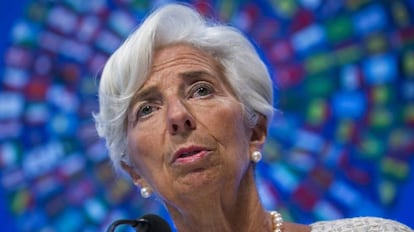IMF: Spain’s richest 20% earn seven times more than poorest 20%
World body warns the country is among EU’s worst offenders in terms of income inequality
The International Monetary Fund (IMF) is warning that Spain has one of the biggest income gaps in Europe. According to figures released by the global body, the top 20% of Spanish society earns nearly seven and a half times more than the bottom 20%. This puts Spain third on the list of EU countries where the wealthy take a bigger piece of the pie.

“As a result of the crisis, social indicators deteriorated sharply,” reads the IMF’s annual report on the Spanish economy.
In June 2015, the IMF joined the Organization for Economic Cooperation and Development (OECD) in underscoring the problem of income inequality. Since then, the Washington-based organization has argued that the gap between the rich and poor is slowing growth.
In its latest assessment of the Spanish economy, released on Monday, the IMF analyzes the stark consequences of the crisis on income distribution.
Unskilled workers, youths and immigrants are particularly vulnerable, says the report
“Job losses [during the crisis] affected disproportionally low-educated/low wage workers, youth, and immigrants, particularly working in the construction sector under temporary contracts,” the report states.
Although a fast pace of job creation has helped reduce these risks, the benefits of the recovery are being unevenly shared among different generations and different education levels, warns the report.

The IMF recommends implementing policies to improve “the employability of young and low-skilled workers” as a “policy priority to reduce risks of social exclusion among vulnerable groups.” The increase in inequality, the study suggests, is not so much due to higher income among the top earners as to the poor situation at the bottom of the economic ladder.
“The number of people at risk of poverty or social exclusion increased by more than 23 percent between 2007 and 2015 in Spain. Low-skilled workers, youth, and immigrants have been particularly vulnerable,” the IMF states.
The IMF notes that this situation is partly due to a correction in wage inflation in sectors with low productivity levels, such as construction. Another contributing factor is the labor market duality between permanent and temporary workers.
English version by Susana Urra.
Tu suscripción se está usando en otro dispositivo
¿Quieres añadir otro usuario a tu suscripción?
Si continúas leyendo en este dispositivo, no se podrá leer en el otro.
FlechaTu suscripción se está usando en otro dispositivo y solo puedes acceder a EL PAÍS desde un dispositivo a la vez.
Si quieres compartir tu cuenta, cambia tu suscripción a la modalidad Premium, así podrás añadir otro usuario. Cada uno accederá con su propia cuenta de email, lo que os permitirá personalizar vuestra experiencia en EL PAÍS.
¿Tienes una suscripción de empresa? Accede aquí para contratar más cuentas.
En el caso de no saber quién está usando tu cuenta, te recomendamos cambiar tu contraseña aquí.
Si decides continuar compartiendo tu cuenta, este mensaje se mostrará en tu dispositivo y en el de la otra persona que está usando tu cuenta de forma indefinida, afectando a tu experiencia de lectura. Puedes consultar aquí los términos y condiciones de la suscripción digital.









































